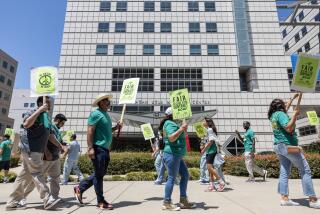UCI Medical Center Halts Talks to Privatize
- Share via
SAN FRANCISCO — In what advocates for the poor say is a victory for indigent health care in Orange County, UC Irvine has ended talks with a private hospital chain to run the financially ailing UCI Medical Center, officials said Wednesday.
UC Irvine Chancellor Laurel L. Wilkening and medical center Director Mark Laret told the UC Board of Regents that UCI and Tenet Healthcare Corp. mutually agreed to end discussions on a long-term lease for the Orange facility.
Wilkening said it makes better economic sense for UCI Medical Center to remain a UC hospital, though the university is still discussing affiliations with private health care providers for some programs.
UCI officials, for instance, have begun talks with the private Children’s Hospital of Orange County for a joint pediatrics program, Laret said.
Advocates for the poor hailed the news. Many had feared that the medical center--the chief provider of care for the indigent and uninsured in Orange County--would turn away the poor if it were run by a for-profit company.
“I’m very pleased. I’m hoping that [medical center officials] are able to find a way to maintain their independence,” said Jean Forbath, past chairwoman of the Health Care Council of Orange County.
Kathleen A. Belkham, executive director of the Coalition of Orange County Community Clinics, said the medical center “has long been a provider of services to the underserved.”
Under university management, the community can feel more assured that the medical center will continue to serve the poor, said Belkham, who is also chairwoman of the Health Care Council. “It is probably good for the county overall and good for the institution itself.”
The hospital is caught between rising costs associated with its teaching mission and declining revenue as a result of competition for insured patients, who increasingly are turning to managed care groups. Those organizations typically provide much of their patient care in outpatient clinics at cut-rate prices, which has attracted employers seeking ways to pay less for worker benefits. Shrinking government subsidies also have hurt the hospital.
With UCI Medical Center’s financial future uncertain in an increasingly competitive market, the UC Board of Regents last year authorized the university to pursue a partnership with a private firm. Ten applied, and the list was whittled down to two candidates.
Tenet, which is based in Santa Barbara, operates a number of facilities across the state, including Western Medical Center-Santa Ana and Fountain Valley Regional Hospital and Medical Center.
The other finalist was Nashville-based Columbia/HCA Health Care Corp. Columbia withdrew from talks with UCI last month, however, to focus on government probes of alleged Medicare and Medicaid fraud as well as the indictment of several key executives and multiple lawsuits.
Other UC teaching hospitals have explored affiliations. UC San Francisco’s medical center won approval from the regents Wednesday for a merger with Stanford University’s hospitals. They will operate as a $1-billion, private, nonprofit company.
Many of UCI’s medical faculty expressed relief, though, that they will not be taking that path now.
“We were all worried about the future,” said Dr. Ralph Cygan, vice president of the UCI Medical Group. “Good or bad, it would have been a change.”
In a letter to UCI Medical Center employees Wednesday, Laret said he was disappointed “that the bold new initiative we were pursuing did not work out as we had expected.
“I still believe that ultimately hospitals need to be linked to local networks, and we may revisit this option in the future,” he said.
UCI Medical Center’s economic picture has improved recently, he said. Reversing an $8-million loss for the previous year, it reported a profit of $13 million for the fiscal year ended June 30.
But that was largely due to one-time infusion of $16 million of government funds. Subsidies from the federal and state governments, amounting to $50 million over three years, will bail out the hospital again, Laret said. He described this money as supplemental funds from such sources as tobacco taxes.
Laret predicted that the medical center will at least break even next year.
More to Read
Sign up for Essential California
The most important California stories and recommendations in your inbox every morning.
You may occasionally receive promotional content from the Los Angeles Times.










